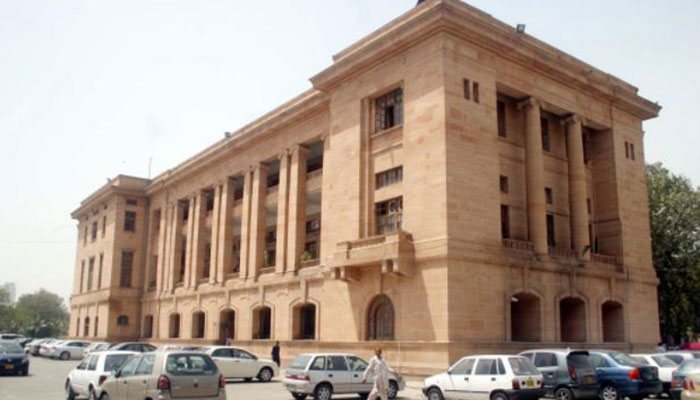SHC to hear SIC plea over reserved seats matter on urgent basis
ECP had ruled that PTI-backed SIC is not eligible for reserved seats allotted to women and minorities
KARACHI: The Sunni Ittehad Council (SIC) on Friday filed a petition in the Sindh High Court (SHC) against the Election Commission of Pakistan's (ECP) decision to not allot the reserved seats to the party.
The court accepted the petition and also fixed it for an urgent hearing of the petition in view of the importance of the matter.
The party, which was joined by Pakistan Tehreek-e-Insaf (PTI) affiliated backed independent candidates who had won the February 8 general elections to claim reserved seats, filed the plea today.
On March 4, the Election Commission of Pakistan (ECP) ruled that PTI-backed SIC is not eligible for the reserved seats allotted to women and minorities.
Following the electoral body's verdict, the party approached the Peshawar High Court (PHC) against the reserved seats matter.
The court on Wednesday barred the oath-taking of lawmakers notified on reserved seats denied to the SIC. A stay order preventing members from swearing-in was also issued while ECP was directed to submit its response in the said matter.
A day earlier, the PHC extended the stay order on the oath-taking ceremony of lawmakers and summoned Attorney General for Pakistan Mansoor Usman Awan to appear before the court on the next hearing.
The same day, SIC also approached the Lahore High Court (LHC) on Thursday against the ECP's move for not giving them reserved seats in Punjab.
ECP's verdict
In the verdict, the ECP said it extended the deadline to submit a priority list for the reserved seats of women, and the SIC, before the February 8 polls, did not submit the required list which was "mandatory".
The electoral body said the SIC cannot claim the share in the reserved seats for the women “due to non-curable procedural and legal defects and violations of mandatory provisions of the Constitution”.
The ECP verdict cited Article 51(6), saying the article clearly stated the reserved seats would be allocated to the political parties who contested elections and won general seats based on a “proportional representation system”.
It further stated that the per centum share of each political party shall be worked out with reference to the total number of general seats in the National Assembly and the provincial assembly.
“The same formula is provided for the reserved seats for non-Muslims.”
While rejecting the plea of SIC, the ECP accepted applications of the opposing parties and decided that the seats in the National Assembly would not remain vacant and be allocated by a proportional representation process of political parties on the basis of seats won by political parties.
“[The] Office is directed to calculate the quota accordingly,” read the verdict.
-
Security forces gun down 30 terrorists in multiple IBOs in KP: ISPR
-
MQM-P calls for new province in Sindh
-
US report validates Pakistan military edge over India: PM
-
Banned TTP poses serious threat to Pakistan security: UNSC panel
-
CM Afridi clarifies remarks on by-poll after ECP requests army deployment
-
Dubai sees 3.2m Pakistani passengers in 2025 as airport sets new milestone
-
Security forces kill 23 Indian proxy terrorists in KP's Kurram
-
Pakistan to construct island to boost oil exploration: report












